-
 Bitcoin
Bitcoin $76,479.4701
-3.52% -
 Ethereum
Ethereum $1,469.1142
-5.46% -
 Tether USDt
Tether USDt $0.9993
-0.03% -
 XRP
XRP $1.7902
-4.83% -
 BNB
BNB $551.0674
-0.78% -
 USDC
USDC $1.0003
0.02% -
 Solana
Solana $105.4201
-1.56% -
 TRON
TRON $0.2301
0.50% -
 Dogecoin
Dogecoin $0.1423
-4.38% -
 Cardano
Cardano $0.5589
-4.51% -
 UNUS SED LEO
UNUS SED LEO $9.0173
0.56% -
 Toncoin
Toncoin $3.0027
-2.56% -
 Chainlink
Chainlink $10.9146
-4.73% -
 Stellar
Stellar $0.2207
-4.45% -
 Avalanche
Avalanche $16.1527
-4.24% -
 Shiba Inu
Shiba Inu $0.0...01066
-6.81% -
 Sui
Sui $1.9318
-3.99% -
 Hedera
Hedera $0.1462
-4.08% -
 MANTRA
MANTRA $6.2098
-1.18% -
 Dai
Dai $1.0001
0.01% -
 Bitcoin Cash
Bitcoin Cash $268.3547
-2.84% -
 Polkadot
Polkadot $3.3678
-6.32% -
 Litecoin
Litecoin $69.1437
-2.09% -
 Ethena USDe
Ethena USDe $0.9986
-0.03% -
 Bitget Token
Bitget Token $3.9888
-4.59% -
 Hyperliquid
Hyperliquid $11.6557
0.72% -
 Pi
Pi $0.5672
-1.97% -
 Monero
Monero $196.0247
-4.01% -
 OKB
OKB $51.1597
0.14% -
 Uniswap
Uniswap $4.7818
-6.32%
How does NFT Marketplace facilitate the trading of digital assets?
NFT marketplaces, using blockchain and smart contracts, facilitate secure buying, selling, and trading of unique digital assets. Understanding fees and marketplace policies is crucial for safe transactions.
Mar 02, 2025 at 12:19 pm
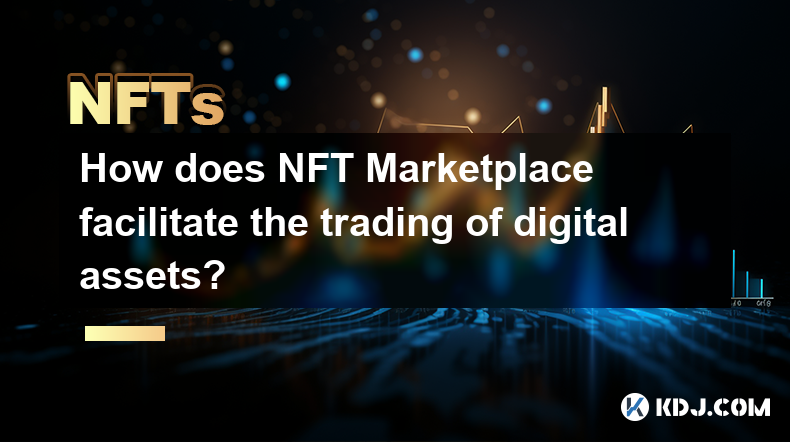
Key Points:
- NFTs are unique digital assets verifiable on a blockchain.
- NFT marketplaces provide a platform for buying, selling, and trading these assets.
- These marketplaces utilize smart contracts to automate transactions and ensure security.
- Various marketplaces cater to different NFT types and communities.
- Understanding fees, security measures, and marketplace policies is crucial for safe trading.
How Does NFT Marketplace Facilitate the Trading of Digital Assets?
Non-Fungible Tokens (NFTs) represent ownership of unique digital or physical assets, verified on a blockchain. These assets can range from digital art and collectibles to in-game items and virtual real estate. However, without a centralized platform, trading these unique assets would be incredibly complex. This is where NFT marketplaces step in. They provide a user-friendly interface and the necessary infrastructure to facilitate the buying, selling, and trading of NFTs.
NFT marketplaces act as intermediaries, connecting buyers and sellers. They offer a secure environment for transactions, leveraging blockchain technology to ensure the authenticity and ownership of each NFT. This security is paramount, given the unique and often valuable nature of the assets traded. The marketplaces handle the complexities of blockchain interactions, making the process accessible to a wider audience.
The core mechanism behind NFT marketplace functionality is the smart contract. These self-executing contracts automatically handle the transfer of ownership when a sale is completed. This automation eliminates the need for intermediaries and significantly reduces the risk of fraud. Smart contracts also define the terms of the sale, including pricing and payment methods, ensuring transparency and trust between buyers and sellers.
A wide variety of NFT marketplaces exist, each catering to different niches and communities. Some focus on specific types of NFTs, like digital art or gaming items. Others cater to broader audiences, offering a diverse range of digital collectibles. This diversity provides users with choices based on their preferences and the type of NFTs they wish to trade. Choosing the right marketplace is a crucial step in a successful NFT transaction.
The Process of Buying and Selling NFTs on a Marketplace:
Buying an NFT typically involves these steps:
- Creating an Account: Registering an account on the chosen marketplace, often requiring a cryptocurrency wallet connection.
- Connecting a Wallet: Linking a compatible digital wallet (like MetaMask) to manage your cryptocurrency and NFTs.
- Browsing the Marketplace: Exploring available NFTs, filtering by category, price, and other attributes.
- Making an Offer or Buying: Placing a bid on an NFT or directly purchasing it if it's listed for a fixed price.
- Completing the Transaction: Confirming the purchase using your connected wallet, paying the necessary fees.
Selling an NFT usually involves these steps:
- Listing an NFT: Creating a listing for your NFT, specifying the price or accepting bids.
- Setting a Price or Reserve: Determining the minimum price you are willing to accept for your NFT.
- Managing Bids (if applicable): Reviewing and accepting bids from potential buyers.
- Completing the Sale: Confirming the sale once a buyer accepts your price or highest bid.
- Receiving Payment: Receiving payment in the specified cryptocurrency after the sale is finalized.
Understanding Fees and Security:
NFT marketplaces typically charge fees for both buyers and sellers. These fees can vary significantly between marketplaces and often include transaction fees, platform fees, and potentially gas fees (for blockchain transactions). It's crucial to understand these fees before engaging in any transactions to avoid unexpected costs.
Security is a critical aspect of any NFT marketplace. Reputable marketplaces employ robust security measures to protect users from scams and fraud. However, users should also take precautions, such as only using trusted marketplaces, verifying the authenticity of NFTs, and being wary of phishing attempts. Always double-check the marketplace's security policies before making any transactions.
Different Types of NFT Marketplaces:
The NFT marketplace landscape is constantly evolving, with new platforms emerging regularly. Some of the most well-known marketplaces include OpenSea, Rarible, SuperRare, and Foundation. Each platform has its own strengths and weaknesses, catering to different communities and NFT types. For example, SuperRare focuses on high-quality digital art, while OpenSea offers a broader selection of NFTs. Choosing the right platform depends on your specific needs and preferences.
Navigating the Legal and Regulatory Landscape:
The legal and regulatory landscape surrounding NFTs is still developing. Regulations vary significantly across jurisdictions, and the legal implications of owning and trading NFTs are not always clearly defined. Users should be aware of the potential legal and tax implications before engaging in NFT transactions. Consulting with legal professionals is recommended for complex transactions or significant financial investments.
Common Questions:
Q: What is a cryptocurrency wallet, and why is it needed to trade NFTs?
A: A cryptocurrency wallet is a digital application that stores and manages your cryptocurrencies and NFTs. It's essential for trading NFTs because it's used to send and receive the cryptocurrency needed for transactions and to store the NFTs you purchase.
Q: How do I choose the right NFT marketplace?
A: Consider factors like the types of NFTs offered, the platform's reputation and security, the fees charged, and the overall user experience. Research different marketplaces to find one that best suits your needs and preferences.
Q: What are gas fees, and why do they occur?
A: Gas fees are transaction fees paid to the miners or validators who process transactions on the blockchain. These fees are essential for securing the network and incentivizing participation. Their amount fluctuates based on network congestion.
Q: Are NFTs safe from fraud?
A: While reputable marketplaces employ security measures, the risk of fraud still exists. It's crucial to conduct due diligence, only use trusted platforms, and be wary of phishing scams to minimize risks. Verifying the authenticity of NFTs before purchase is also crucial.
Q: What are the tax implications of buying and selling NFTs?
A: The tax implications of NFT transactions vary significantly depending on your jurisdiction and the specifics of your transactions. It's essential to consult with a tax professional to understand the tax rules applicable to your situation. NFT transactions may be subject to capital gains tax, depending on the profit made.
Disclaimer:info@kdj.com
The information provided is not trading advice. kdj.com does not assume any responsibility for any investments made based on the information provided in this article. Cryptocurrencies are highly volatile and it is highly recommended that you invest with caution after thorough research!
If you believe that the content used on this website infringes your copyright, please contact us immediately (info@kdj.com) and we will delete it promptly.
- "Cardano (ADA) Price Could Dip Below $0.60, Following Previous Market Cycle"
- 2025-04-09 05:10:12
- BONK, the well-known meme coin, has risen over 35% in the last week, attracting meme coin investors in the market. So, what caused this rally?
- 2025-04-09 05:10:12
- Bitcoin (BTC) Investors May Not Exactly Feel It, but BTC Has Been a Relatively Good Bet
- 2025-04-09 05:05:12
- Donald's Bitcoin (DONBTC) Could Turn Early Investors into Multi-Millionaires, Like Shiba Inu (SHIB) and Dogecoin (DOGE) Did
- 2025-04-09 05:05:12
- 6 Upcoming Kraken Listings That Could Be the Next Big Thing in Crypto
- 2025-04-09 05:00:13
- COTI Unveils New Privacy-Focused Blockchain to Reshape Web3 Transactions
- 2025-04-09 05:00:13
Related knowledge
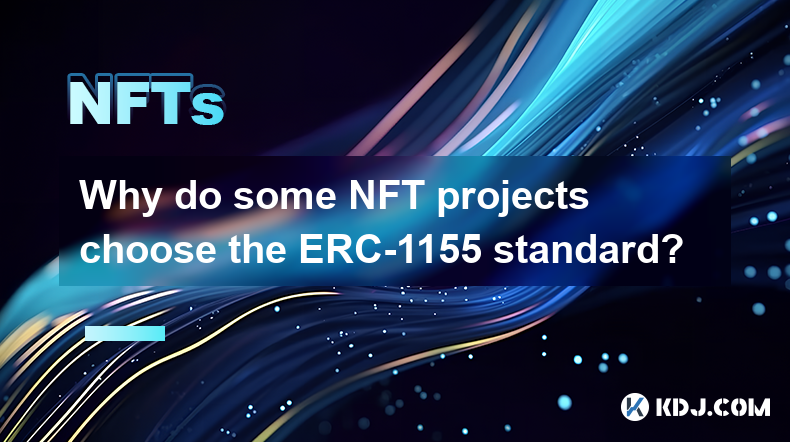
Why do some NFT projects choose the ERC-1155 standard?
Apr 08,2025 at 11:49am
The world of Non-Fungible Tokens (NFTs) has seen a significant rise in popularity and innovation, leading to the development of various token standards. Among these, the ERC-1155 standard has emerged as a versatile and efficient choice for many NFT projects. This article delves into the reasons why some NFT projects opt for the ERC-1155 standard, explor...
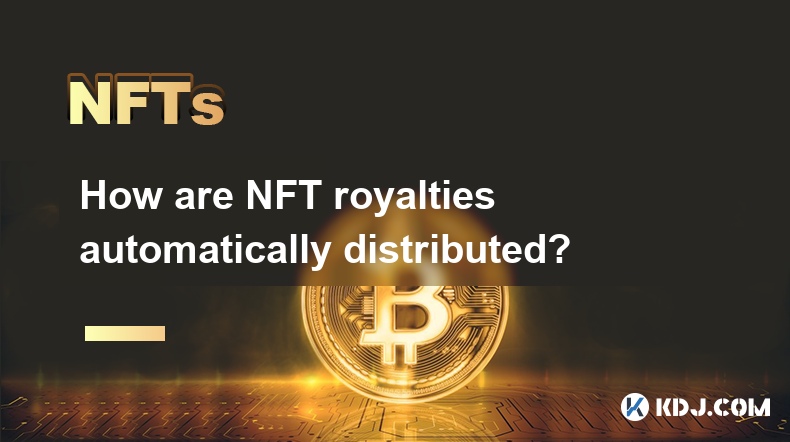
How are NFT royalties automatically distributed?
Apr 08,2025 at 08:14pm
NFTs, or Non-Fungible Tokens, have revolutionized the digital art and collectibles market by providing a way to prove ownership and authenticity of digital assets. One of the most intriguing features of NFTs is the ability to automatically distribute royalties to creators whenever their work is resold. This article will delve into the mechanisms behind ...
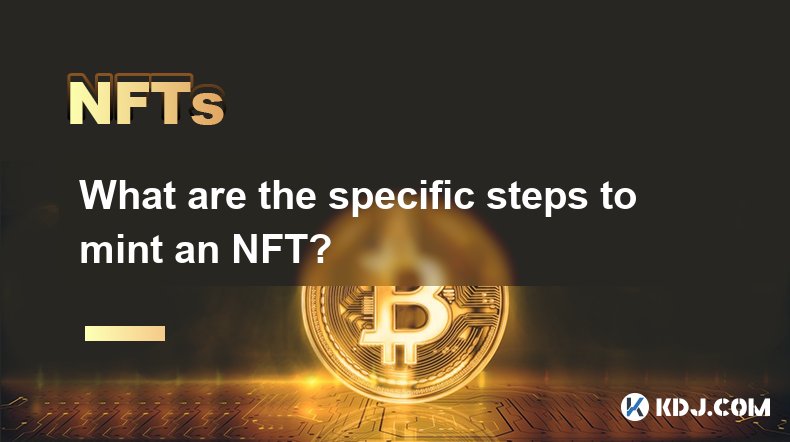
What are the specific steps to mint an NFT?
Apr 08,2025 at 05:22pm
Introduction to NFT MintingMinting an NFT, or Non-Fungible Token, involves creating a unique digital asset on a blockchain. This process allows artists, creators, and collectors to tokenize their work, ensuring its authenticity and ownership. Understanding the steps to mint an NFT is crucial for anyone looking to enter the world of digital collectibles....
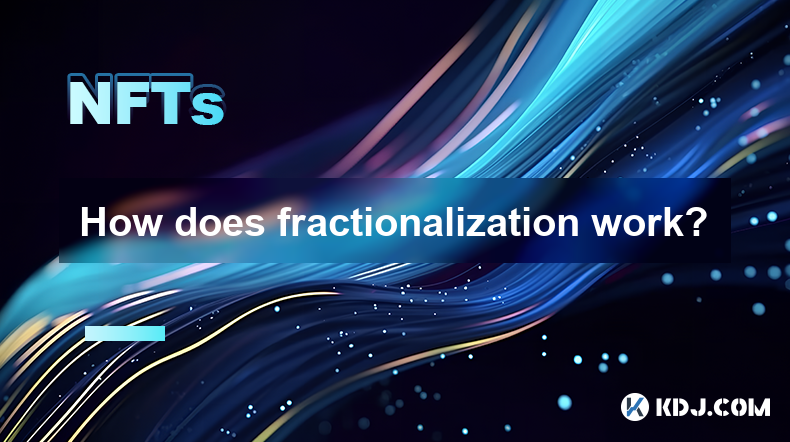
How does fractionalization work?
Apr 08,2025 at 07:42pm
How does fractionalization work? Fractionalization in the context of cryptocurrencies and blockchain technology refers to the process of dividing a single asset into smaller, more manageable pieces. This concept has revolutionized the way investors and users interact with high-value assets, making them more accessible and liquid. In this article, we wil...
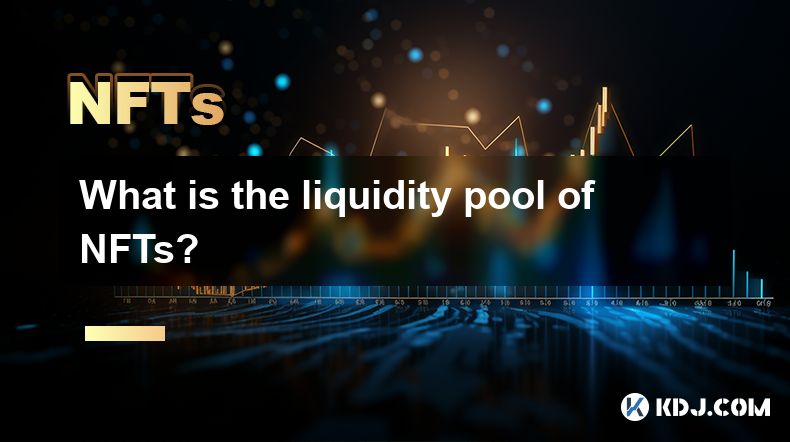
What is the liquidity pool of NFTs?
Apr 08,2025 at 05:35pm
The concept of liquidity pools has become increasingly popular within the cryptocurrency and decentralized finance (DeFi) ecosystems. While traditionally associated with token swaps, the idea has extended to the realm of Non-Fungible Tokens (NFTs). Liquidity pools for NFTs are mechanisms that facilitate the trading and exchange of these unique digital a...
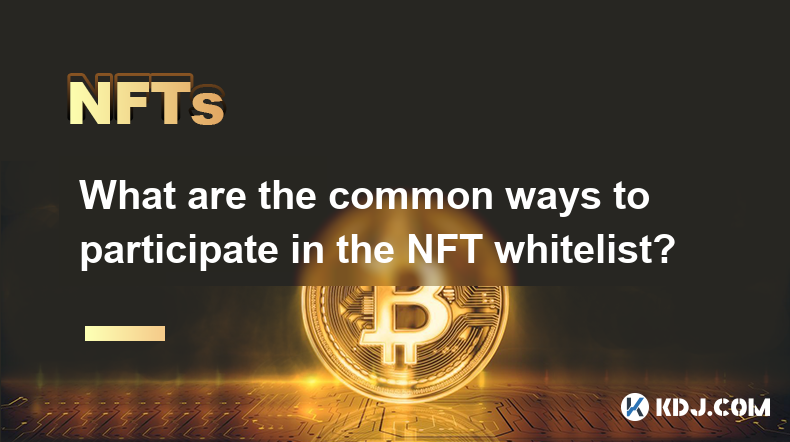
What are the common ways to participate in the NFT whitelist?
Apr 08,2025 at 08:28pm
Participating in an NFT whitelist can be an exciting opportunity for enthusiasts and investors looking to secure their spot in upcoming NFT drops. The whitelist often grants early access or special privileges, such as lower minting fees or guaranteed allocations. Here, we will explore the common ways to participate in an NFT whitelist, detailing each me...

Why do some NFT projects choose the ERC-1155 standard?
Apr 08,2025 at 11:49am
The world of Non-Fungible Tokens (NFTs) has seen a significant rise in popularity and innovation, leading to the development of various token standards. Among these, the ERC-1155 standard has emerged as a versatile and efficient choice for many NFT projects. This article delves into the reasons why some NFT projects opt for the ERC-1155 standard, explor...

How are NFT royalties automatically distributed?
Apr 08,2025 at 08:14pm
NFTs, or Non-Fungible Tokens, have revolutionized the digital art and collectibles market by providing a way to prove ownership and authenticity of digital assets. One of the most intriguing features of NFTs is the ability to automatically distribute royalties to creators whenever their work is resold. This article will delve into the mechanisms behind ...

What are the specific steps to mint an NFT?
Apr 08,2025 at 05:22pm
Introduction to NFT MintingMinting an NFT, or Non-Fungible Token, involves creating a unique digital asset on a blockchain. This process allows artists, creators, and collectors to tokenize their work, ensuring its authenticity and ownership. Understanding the steps to mint an NFT is crucial for anyone looking to enter the world of digital collectibles....

How does fractionalization work?
Apr 08,2025 at 07:42pm
How does fractionalization work? Fractionalization in the context of cryptocurrencies and blockchain technology refers to the process of dividing a single asset into smaller, more manageable pieces. This concept has revolutionized the way investors and users interact with high-value assets, making them more accessible and liquid. In this article, we wil...

What is the liquidity pool of NFTs?
Apr 08,2025 at 05:35pm
The concept of liquidity pools has become increasingly popular within the cryptocurrency and decentralized finance (DeFi) ecosystems. While traditionally associated with token swaps, the idea has extended to the realm of Non-Fungible Tokens (NFTs). Liquidity pools for NFTs are mechanisms that facilitate the trading and exchange of these unique digital a...

What are the common ways to participate in the NFT whitelist?
Apr 08,2025 at 08:28pm
Participating in an NFT whitelist can be an exciting opportunity for enthusiasts and investors looking to secure their spot in upcoming NFT drops. The whitelist often grants early access or special privileges, such as lower minting fees or guaranteed allocations. Here, we will explore the common ways to participate in an NFT whitelist, detailing each me...
See all articles






















































































